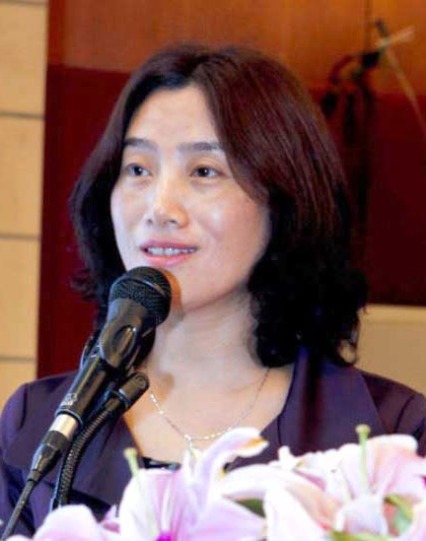
Min Zhao, M.D., Ph.D., is a professor of psychiatry, leader of the Shanghai Mental Health Center and vice president at the Shanghai Jiaotong University School of Medicine in China. She was a 2001 INVEST Fellow with Howard Liddle, Ed.D. at the University of Miami Miller School of Medicine (Florida) and received a 2005 NIDA Distinguished International Scientist Collaboration Award to work with Clyde McCoy, Ph.D., at the University of Miami Miller School of Medicine. In 2013, Dr. Zhao shared a NIDA International Program Award of Excellence in Collaborative Research with Yih-Ing Hser, Ph.D., University of California, Los Angeles, for their work on NIDA-funded studies of methadone maintenance treatment for opioid use disorder in China. Dr. Zhao has built institutional partnerships with U.S. and international universities, the United Nations Office on Drugs and Crime (UNODC), and the World Health Organization (WHO), and she has helped young researchers at the Shanghai Mental Health Center earn additional NIDA International Program fellowships and NIH grants in their own names. This interview is based on her webinar for the International Society of Addiction Medicine (ISAM) Neuroscience Interest Group series, “In Love with Addiction Neuroscience.”
How did you decide to become an addiction scientist?
I am a psychiatrist but love neuroscience. I was frustrated by the high relapse rates when I worked with substance-dependent patients in my early career. I learned that addiction is a complex brain disease and needs effective treatments targeted to the pathological changes in patients’ brains. Therefore, I started to do research on addiction, mainly focusing on the mechanisms of addiction and clinical interventions since 1996.
You’ve conducted research on heroin dependence, methamphetamine dependence, and some innovative interventions using artificial intelligence, virtual reality, or computerized cognitive therapy. What do you consider to be your most important research findings?
The main direction of my research group is to develop effective interventions and improve clinical practice. We conducted a series of studies to develop culturally based psychological and behavioral interventions for addiction, such as motivational interviewing, cognitive behavioral therapy, contingency management, relapse prevention, and social interventions, but their availability was limited in China due to a shortage of professional human resources. Recently we have tried to develop innovative interventions using artificial intelligence, virtual reality, computerized cognitive therapy, or neural modulation technology, which need fewer human resources. Among our studies, I think the implementation of neural modulation technology in addiction treatment is most important and promising because it could remedy the impaired brain network or circuit in patients with addiction. For example, we find repetitive transcranial magnetic stimulation (rTMS) on the dorsolateral and medial prefrontal cortex can decrease craving and change the related brain network, but more research is needed to find precise intervention protocols and adopt rTMS in clinical practice.
How did you learn about the NIDA INVEST Fellowship and the Distinguished International Scientist Award?
I learned about the fellowship from the website of the NIDA International Program, and then I referred it to my colleagues in China.
How did the NIDA International Program awards influence your career?
The most important influence is that I met great international scientists during my INVEST fellowship and started to join the international network of scientists in the addiction field. All these experiences reinforced my research interest in addiction and strengthened my international collaboration relationships, which has been most important in my academic career.
How was it difficult to transition back to China, especially after your year-long INVEST Fellowship?
During my INVEST Fellowship, I learned that multidimensional family therapy (MDFT) is a useful tool for treating addiction patients, and I have a strong motivation to implement MDFT in China in order to help patients recover, but the professional shortage and capability make it difficult to implement it in a short period of time. Therefore, I started to work on training programs in China and we carried out a 5-year Sino–U.S. training program from 2005 to 2010.
What role did the NIDA International Forum play in your career?
The Forum is a wonderful platform to connect with other colleagues in the addiction field and gave me the chance to stand on the international stage. I got opportunities to join several important projects from UNODC and WHO due to participating in the NIDA International Forum. It is my favorite international meeting, and I tried to attend it almost every year after my INVEST fellowship for probably 5 or 6 years and still attend it.
You’ve been involved in several international collaborations. How do these international partners influence your research?
Addiction is a worldwide public health issue, and international collaboration is very important. It was my great pleasure and so enjoyable to work with international scientists. I learned a lot from international collaborators not only academically but also from their support and help. My international experiences also provide me resources for teaching my students and young scientists and enhancing my leadership in my center.
What qualities should scientists look for in a mentor?
The most important qualities for a mentor are willingness to teach, passion in their scientific field, hard work, good communication skills, and leadership.
You now head a major research facility in China, and at least two of your colleagues have also received NIDA International Program fellowships (Jiang Du and Haifeng Jiang). Do your INVEST or Distinguished International Scientist experiences help you mentor early career scientists?
Yes, it helps a lot. Both my INVEST Fellowship and Distinguished international Scientist Collaboration Award offered me terrific opportunities to learn how to mentor young scientists, lead a research team, and build my leadership capabilities.
What advice do you have for early career investigators?
Find a loved area, and stick to it, Remain curious and motivated, and develop critical thinking. Keep an open mind, and connect to the network of scientists in this field. Attend international conferences or participate in international collaborative projects, and give your advice to your patients.